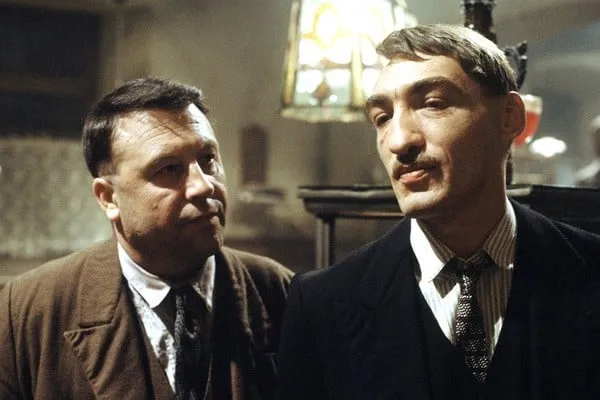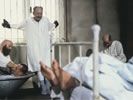Eye For Film >> Movies >> Berlin Alexanderplatz (1980) Film Review

Former transport worker Franz Biberkopf (Günter Lamprecht) is released from prison into the turbulent world of Weimar Germany, having serverd a four-year sentence for killing his girlfriend for prostituting herself.
Though endeavouring to live an honest life with his new girlfriend, Lina (Elisabeth Trissenaar), times are hard. After going from one job to another and being betrayed by Lina's uncle Meck (Franz Buchrieser), Biberkopf succumbs to drink and despair.

He then has the misfortune to meet Reinhold (Gottfried John), a psychopathic small-time criminal in the Pums gang.
Reinhold takes advantage of Biberkopf, culminating in his acting as look out on a robbery; as the gang make their getaway Biberkopf is pushed out of the car, run over by another and loses an arm.
Another ex-girlfriend, Eva (Hanna Schygulla), and her pimp, Herbert, help Biberkopf while he makes his recovery and introduce him to Mieze (Barbara Sukowa). They fall in love; she turns to prostitution to support them. Biberkopf remains uncomfortable with this, and is brought to the brink of despair once more when Mieze announces her intention of going away for three days with a rich customer.
Biberkopf falls back within the Pums gang's orbit, while Mieze announces that she is in love with another. Though Franz almost kills her, she stays with him. Unfortunately for both, Reinhold also desires her; when she refuses him, he murders her. Reinhold winds up in jail and Franz in the madhouse, where he converses with two angels in what seems to be an allusion to Walter Benjamin and Paul Klee's backwards-facing Angelus Novus...
Rainer Werner Fassbinder's celebrated adaptation of one of the seminal modernist novels of the 20th century, Alfred Döblin's Berlin Alexanderplatz, is the kind of film which leaves this reviewer with a difficult task.
What can you say about the sprawling 15 and a half-hour work other than it is an epic, a magnum opus, a towering achievement for both its prolific director and the New German Cinema as a whole? How can you hope to summarise it or do justice to its complexities – here remembering that Döblin's model was James Joyce’s Ulysses – in a few hundred words?
Berlin Alexanderplatz is daunting even in its sheer scale. You could watch Syberberg's Hitler - ein Film aus Deutschland (442 minutes) and Parsifal (255 minutes) and still have time left over.
But at least one can offer a suggestion here: consider Berlin Alexanderplatz less as a single, self-contained film to be watched at one or two sittings and remember that it was a mammoth TV production; think on it as a German enfant terrible’s equivalent of Lost, 24, Twin Peaks or whatever other episodic, story-arc series you're happy to watch an hour or a week or sit down with for a marathon viewing session over a bank holiday weekend.
The comparison isn't as odd as it might sound if one also considers the likes of Reitz's Heimat or Kieslowski's Dekalog as other examples of auteur television. It also gains strength from a consideration of the way in which Fassbinder’s narrative and aesthetic strategies here are more conventional, less modernist and confrontational than those of his earlier cinema works in particular.
It’s telling in this regard that one of the main criticism many in Germany had on the series’ original screening was that its visuals were too dark; hardly the most alienated or uncomprehending of responses.
This said, one doesn’t want to give the impression that Berlin Alexanderplatz is a flawless masterpiece.
Döblin purists may object to Fassbinder’s departure from the text in the form of the 14th part, an epilogue in which Fassbinder reflects on the process of adapting the text and its continuing relevance for the Germany of his day to be a step too far, as the likes of Kraftwerk appear on the soundtrack, while at a more mundane level some of the supporting players are not entirely satisfactory - an inevitability when you consider there 100 or so name characters and literally thousands of extras.
Nevertheless, as a sustained accomplishment in acting – the leads are universally impeccable – writing, design, mise-en-scene and sundry other aspects of the art of film-making, there can be little question that it is a masterpiece.
Reviewed on: 22 Oct 2007


















